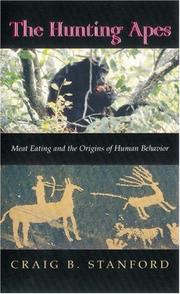| Listing 1 - 4 of 4 |
Sort by
|
Book
ISBN: 0822371944 Year: 2018 Publisher: Durham : Duke University Press,
Abstract | Keywords | Export | Availability | Bookmark
 Loading...
Loading...Choose an application
- Reference Manager
- EndNote
- RefWorks (Direct export to RefWorks)
In Decolonizing Extinction Juno Salazar Parreñas ethnographically traces the ways in which colonialism, decolonization, and indigeneity shape relations that form more-than-human worlds at orangutan rehabilitation centers on Borneo. Parreñas tells the interweaving stories of wildlife workers and the centers' endangered animals while demonstrating the inseparability of risk and futurity from orangutan care. Drawing on anthropology, primatology, Southeast Asian history, gender studies, queer theory, and science and technology studies, Parreñas suggests that examining workers’ care for these semi-wild apes can serve as a basis for cultivating mutual but unequal vulnerability in an era of annihilation. Only by considering rehabilitation from perspectives thus far ignored, Parreñas contends, could conservation biology turn away from ultimately violent investments in population growth and embrace a feminist sense of welfare, even if it means experiencing loss and pain.
Orangutans --- Wildlife rehabilitation --- Human-animal relationships.
Book
Year: 1927 Publisher: [Washington, D.C.] : [U.S. Government Printing Office],
Abstract | Keywords | Export | Availability | Bookmark
 Loading...
Loading...Choose an application
- Reference Manager
- EndNote
- RefWorks (Direct export to RefWorks)
Apes. --- Chimpanzees. --- Macaques. --- Names. --- Orangutans. --- Bornean orangutan. --- Zoology. --- Human beings.
Book
ISBN: 3489714369 9783489714361 Year: 1977 Volume: 19 19 Publisher: Berlin Parey
Abstract | Keywords | Export | Availability | Bookmark
 Loading...
Loading...Choose an application
- Reference Manager
- EndNote
- RefWorks (Direct export to RefWorks)
Orangutans --- Animal intelligence --- Mammals --- Behavior --- Orangutan --- -Animal intelligence --- -Eutheria --- Mammalia --- Mammalians --- Prototheria --- Theria --- Vertebrates --- Intellect of animals --- Intelligence of animals --- Animal psychology --- Instinct --- Psychology, Comparative --- Bornean orang-utan --- Orang-utan --- Orang-utans --- Pongo pygmaeus --- Simia satyrus --- -Behavior --- Orangutans - Behavior --- Mammals - Behavior

ISBN: 0691088888 Year: 2001 Publisher: Princeton, N.J. : Princeton Univ. Press,
Abstract | Keywords | Export | Availability | Bookmark
 Loading...
Loading...Choose an application
- Reference Manager
- EndNote
- RefWorks (Direct export to RefWorks)
"What makes humans the most successful animal species inhabiting the Earth today? Most scientists agree that the key to our success is the unusually large size of our brains. In this provocative book, Craig Stanford presents an intriguing alternative to this puzzling question -- an alternative grounded in recent, pathbreaking scientific observation. According to Stanford, what made humans unique was meat -- specifically, the hunting and sharing of meat. Based on new insights into the behavior of chimps and other great apes, our now extinct human ancestors, and existing hunting and gathering societies, Stanford shows the remarkable role that meat has played in these societies. Book jacket."--Jacket.
Hunting and gathering societies. --- Human evolution. --- Apes --- Food. --- Behavior. --- Adaptations. --- Alliance formation. --- Ambush hunting. --- Australopithecines. --- Bailey, Robert. --- Bipedalism. --- Boesch, Christophe. --- Bone marrow. --- Brain size. --- Bunn, Henry. --- Calories from meat. --- Capuchins. --- Chimpanzee intelligence. --- Cooperative hunting. --- DNA sequences. --- Darwinian theory of mind. --- Deception. --- Division of spoils. --- Egalitarianism. --- Evolution of hierarchy. --- Evolutionary psychology. --- False alarm calls. --- Female chimpanzees. --- Feminist anthropology. --- Foragers. --- Gorilla society. --- Great ape societies. --- Hadza of northern Tanzania. --- Hominid ancestors. --- Howling monkeys. --- Hyenas. --- Jerison, Harry. --- Kaplan, Hillard. --- Knuckle walking. --- Kung San of Kalahari desert. --- Lancaster, Chet. --- Lovejoy, Owen. --- Machiavellian intelligence. --- Man the Meat-possessor. --- Natural selection. --- Neandertals. --- Omnivores. --- Ovulation. --- Patriarchal societies. --- Pleiotropic effects. --- Prosimians. --- Rape among orangutans. --- Scavengers. --- Social environment. --- Taphonomy. --- infanticide among gorillas.
| Listing 1 - 4 of 4 |
Sort by
|

 Search
Search Feedback
Feedback About
About Help
Help News
News